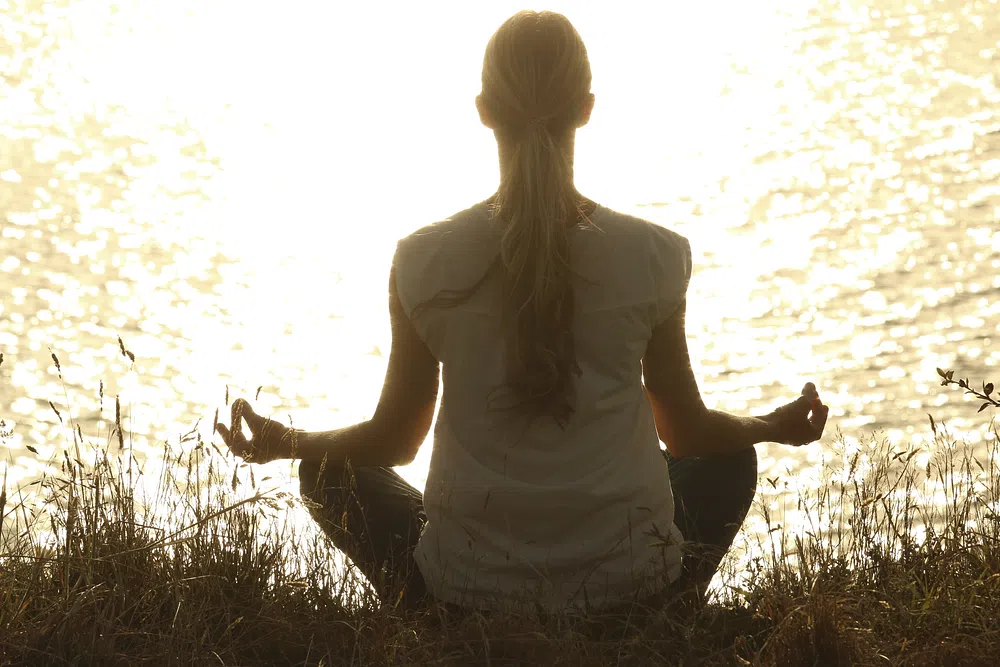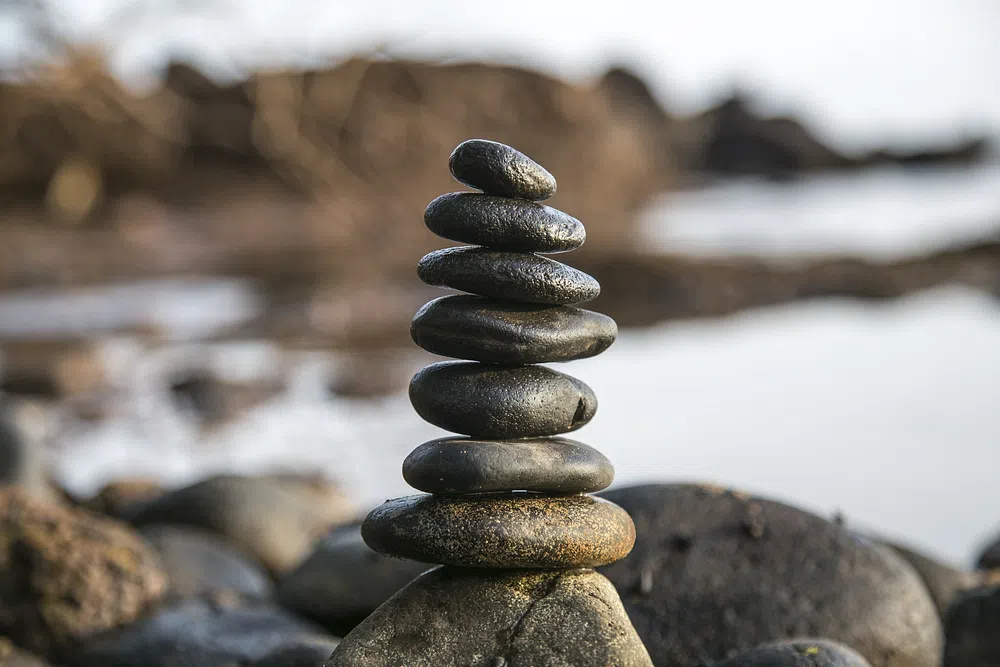In the bustling, 24/7 world we live in, the concept of slowing down and finding moments of calm can feel like a distant dream. Our lives are often marked by endless to-do lists, screens that never sleep, and a constant whirlwind of thoughts. It’s no surprise that many of us struggle with sleep, one of the essential pillars of well-being.
But what if I told you there’s a path to peaceful, restorative sleep, even in the midst of life’s chaos? It’s a practice that doesn’t involve pills, gadgets, or any complicated rituals. It’s something that taps into the incredible power of your own mind – sleep meditation.
In this post, we’re about to embark on a journey that will take you beyond the realms of traditional sleep advice. We’ll explore the incredible health benefits of sleep meditation and how it can transform your nights, your days, and your entire life.
Are you ready to embrace the magic of sleep meditation? Let’s dive in.

The Sleep Struggle: Why Sleep Matters
Unlocking the Power of Sleep
Quality sleep is the cornerstone of our well-being, yet it often eludes us in the chaos of modern life. As we begin our journey into sleep meditation, it’s crucial to understand why sleep matters more than we might realize and how it ripples through various facets of our lives.
1. The Importance of Quality Sleep:
Quality sleep isn’t just a luxury; it’s a fundamental requirement for a healthy life. It’s during these nightly hours that our bodies and minds undergo essential processes that support overall well-being. Quality sleep:
Restores the Body: Sleep is a time for our bodies to repair and rejuvenate. It’s when muscles grow, tissues heal, and the immune system strengthens.
Nurtures the Mind: Sleep is essential for cognitive functions. It enhances memory consolidation, problem-solving abilities, and creativity.
Balances Emotions: Sleep plays a crucial role in emotional regulation. A lack of sleep can lead to increased irritability, mood swings, and even depression.
2. The Prevalence of Sleep Issues:
In today’s fast-paced world, quality sleep has become a precious commodity, and sleep issues are alarmingly prevalent:
Sleep Deprivation Epidemic: According to the CDC, more than one-third of adults in the United States don’t get enough sleep regularly.
Rising Insomnia Cases: Insomnia, characterized by difficulty falling asleep or staying asleep, affects millions worldwide. It’s a clear indicator of our collective struggle with sleep.
3. Consequences of Sleep Deprivation:
The consequences of sleep deprivation extend far beyond feeling groggy in the morning:
Physical Toll: Sleep deprivation is linked to obesity, heart disease, diabetes, and a weakened immune system.
Mental Fog: Lack of sleep impairs cognitive functions, including decision-making and problem-solving.
Emotional Turmoil: Mood disorders and increased stress are common outcomes of chronic sleep deprivation.
The Ripple Effects:
Now, let’s explore how the lack of quality sleep touches on various aspects of our lives:
Relationships: Sleep deprivation can strain relationships. Irritability and mood swings can lead to conflicts with loved ones. By prioritizing quality sleep, you’ll bring a more patient, emotionally balanced self to your interactions.
Career Paths: A well-rested mind is more focused and creative. Quality sleep can enhance your problem-solving abilities and decision-making skills, potentially opening doors to new career opportunities.
Overall Happiness: When you sleep better, you wake up with a brighter outlook on life. Your overall happiness improves as you feel more in control of your emotions and energy.
As we delve deeper into the world of sleep meditation, remember that we’re not just exploring a practice; we’re unlocking the key to better health, greater mental clarity, and emotional balance.
The journey begins with understanding why quality sleep matters and how it touches every aspect of our lives, from relationships to career paths and overall happiness

The Art of Sleep Meditation
Awakening the Dreamer Within
Sleep meditation, often overlooked in our quest for restful nights, is an art that holds the promise of profound rejuvenation. In this section, we’ll dive into what sleep meditation is, how it distinguishes itself from traditional meditation, and the principles and techniques that make it a powerful practice. Additionally, we’ll explore its rich history and cultural significance.
1. What is Sleep Meditation?
Sleep meditation is a specialized practice designed to guide you into a state of deep relaxation and tranquility, leading to restorative sleep. Unlike traditional meditation, which is often done in a wakeful state, sleep meditation is crafted to transition seamlessly into slumber.
2. The Distinction from Traditional Meditation:
While traditional meditation focuses on mindfulness, awareness, and often requires conscious effort, sleep meditation gently ushers you into the realm of dreams. It acknowledges that our waking and sleeping states are intimately connected, and it harnesses the power of the subconscious mind to facilitate peaceful sleep.
3. Principles and Techniques:
Sleep meditation draws from various techniques, including:
Mindfulness: Like traditional meditation, mindfulness is a key component. It encourages you to anchor your attention to the present moment, allowing worries and distractions to fade.
Visualization: Guided visualizations transport your mind to calming, serene landscapes or scenarios. This serves to reduce stress and anxiety, making it easier to drift into sleep.
Breathing Exercises: Controlled breathing techniques help regulate your breath, slow your heart rate, and signal to your body that it’s time to relax.
Progressive Muscle Relaxation: Often used to relieve stress and anxiety, This method involves tensing and then releasing muscle groups, helping to release physical tension accumulated throughout the day.
4. The Rich History and Cultural Significance:
Ancient Roots:
The roots of sleep meditation run deep in human history. Ancient civilizations recognized the importance of harnessing the power of the mind for restorative sleep. In Egypt, the practice of sleep temples dates back thousands of years, where individuals sought healing and guidance through dream incubation—a form of sleep meditation.
In the Greco-Roman world, sleep was considered a bridge to the divine. Temples were dedicated to Asclepius, the god of healing, where visitors would engage in rituals to induce healing dreams—a precursor to today’s sleep meditation practices.
Eastern Traditions:
In the East, sleep meditation found its place within the spiritual and philosophical traditions of Hinduism and Buddhism. The concept of yoga nidra, often referred to as yogic sleep, is rooted in these ancient practices. Yogis would use yoga nidra to relax the body and mind, leading to deep states of meditative rest and rejuvenation.
Modern Resurgence:
The fast-paced, digitally-driven world of the 21st century has brought new challenges to achieving restful sleep. Stress, anxiety, and the constant stimulation of screens have made quality sleep elusive for many. It’s in this context that sleep meditation has experienced a renaissance.
Modern sleep meditation techniques draw from these ancient practices and meld them with contemporary knowledge of psychology, neuroscience, and relaxation therapy. Guided visualizations, mindfulness, and breathing exercises are seamlessly integrated into easily accessible digital formats, such as meditation apps and online courses.
Sleep Meditation Today:
Today, sleep meditation has become a valuable tool for millions seeking respite from the hectic pace of life. Its popularity spans the globe, offering a holistic approach to addressing sleep issues and improving overall well-being.
In our modern society, sleep meditation serves as a bridge between ancient wisdom and contemporary needs. It acknowledges that, even amidst the digital age’s demands, our need for restful, restorative sleep remains a timeless necessity.
As we continue our journey into sleep meditation, we’ll discover the remarkable health benefits it offers in the context of our fast-paced lives. It’s a testament to the timeless wisdom that still guides us towards the dreamer within—a place where healing, insight, and rejuvenation await.

Beyond Better Sleep: The Ripple Effects
Awakening to a Life Transformed
As we journey deeper into the realm of sleep meditation, we discover that its effects extend far beyond the confines of the night. Time to explore the remarkable ripple effects of restorative sleep through meditation—how it enhances daytime productivity, sparks creativity, enriches the quality of life, deepens our spiritual connection, and fosters self-awareness.
1. Daytime Productivity and Creativity:
The benefits of sleep meditation don’t merely reside in the hours of slumber; they radiate into the waking world:
Enhanced Focus: With improved sleep quality, our cognitive functions sharpen. We find ourselves more attentive, efficient, and capable of tackling tasks with precision.
Boosted Creativity: Restful sleep nurtures our creative spirit. Ideas flow more freely, and problem-solving becomes a natural part of our day.
2. Elevating Overall Quality of Life:
Quality sleep has a profound impact on our well-being:
Increased Energy: Restorative sleep leaves us energized, ready to embrace the day’s challenges and pleasures.
Improved Mood: A well-rested mind is more resilient to stress, promoting a positive outlook and emotional balance.
3. Deepening Spiritual Connection and Self-Awareness:
Beyond the physical and mental realms, sleep meditation opens the door to the spiritual:
Spiritual Connection: In the depths of sleep meditation, we often find a profound connection to our inner selves and the greater universe.
Self-Exploration: The practice encourages self-awareness, helping us understand our thoughts, emotions, and desires more deeply.
As we delve into the stories of those touched by sleep meditation, we recognize that its benefits stretch far beyond the confines of the night. It’s a practice that not only invites restful sleep but also awakens the potential for a more vibrant, creative, and spiritually connected life.
In the realm of sleep meditation, we discover that restful slumber isn’t merely a passive state; it’s a gateway to a life of profound richness and transformation. As we embrace the practice, we embrace the profound ripple effects that transform our nights, our days, and our entire existence.
While it may not always be widely publicized, many celebrities practice sleep meditation or mindfulness techniques to improve their sleep and overall well-being. Here are a few examples:
Oprah Winfrey: Media mogul Oprah Winfrey is a well-known advocate of mindfulness and meditation. She has often talked about how mindfulness and meditation, including sleep meditation, have positively impacted her life.
Arianna Huffington: The co-founder and former editor-in-chief of The Huffington Post, Arianna Huffington, is a strong proponent of the importance of sleep. She has spoken about her commitment to getting enough rest and incorporates meditation practices into her daily routine.
Katy Perry: Pop superstar Katy Perry has openly discussed her struggles with sleep in the past. She turned to meditation, including sleep meditation, as a way to improve her sleep quality and overall well-being.
Russell Brand: Comedian and actor Russell Brand has embraced meditation and mindfulness practices as part of his recovery journey. He often shares his experiences with meditation and its positive effects on his life, including sleep.
Gisele Bündchen: Supermodel Gisele Bündchen practices meditation regularly, and she has mentioned using meditation techniques to help her relax and sleep better.
Kobe Bryant (Late): The late NBA legend Kobe Bryant was known for his dedication to meditation and mindfulness. He often spoke about how these practices helped him perform at his best and improve his sleep.
These celebrity examples demonstrate that sleep meditation is a valuable tool for individuals from all walks of life, including those in the spotlight. It highlights the universality and effectiveness of these practices in promoting better sleep and overall well-being.

Getting Started with Sleep Meditation: Your Path to Peaceful Nights
Embarking on a Serene Journey
Now that we’ve explored the remarkable benefits and transformative power of sleep meditation, it’s time to take your first steps on this path toward tranquil nights and a more enriching life.
In this section, we’ll provide a step-by-step guide to help you start your sleep meditation practice, offer practical tips for success, guide you in creating an ideal sleep environment, and recommend valuable resources to support your journey.
1. Step-by-Step Guide to Sleep Meditation:
Getting started with sleep meditation is easier than you might think. Follow these simple steps:
Select a Comfortable Sleep Position: Find a position in which you feel relaxed and can remain still for an extended period.
Set an Intention: Before you begin, set a clear intention for your meditation session. Whether it’s to achieve deep rest or release stress, clarity of purpose is essential.
Focus on Your Breath: Close your eyes and take a few deep, calming breaths. Concentrate on the rise and fall of your chest or the sensation of your breath entering and leaving your nostrils.
Mindful Body Scan: Gradually shift your attention to different parts of your body, starting from your toes and moving up to your head. Release tension with each exhale.
Visualizations and Guided Imagery: Many sleep meditations involve visualizations or guided imagery. Picture a peaceful place, like a serene beach or a lush forest. Engage your senses as you immerse yourself in this mental oasis.
Practice Mindfulness: If your mind wanders, gently bring your focus back to your breath or the meditation guide’s voice. Be patient with yourself; wandering thoughts are normal.
Find Your Rhythm: Establish a meditation duration that suits you. It can be as short as 10 minutes or as long as an hour. Consistency matters more than duration.
2. Creating a Conducive Sleep Environment:
Your sleep environment plays a crucial role in the success of your meditation practice. Consider these tips:
Comfortable Bedding: Invest in a comfortable mattress, pillows, and bedding that promote relaxation.
Darkness: Ensure your sleep space is as dark as possible. Consider using blackout curtains to block out external light sources.
Quiet: Minimize noise disruptions by using earplugs or a white noise machine if needed.
Temperature Control: Maintain a comfortable room temperature, ideally on the cooler side.
Unplug from Screens: Avoid screens before bedtime. The blue light emitted from phones and tablets can interfere with your sleep.
3. Recommended Resources:
To support your sleep meditation journey, explore these valuable resources:
Meditation Apps: Apps like Calm, Headspace, and Insight Timer offer a variety of guided sleep meditations.
Podcasts: Sleep meditation podcasts, such as “Sleepy” and “Nothing much happens; bedtime stories for grown-ups,” provide soothing narratives to ease you into slumber.
Instructors: Consider seeking out certified meditation instructors or classes in your area.
Now that you have the tools and guidance to begin your sleep meditation practice, take that first step. Remember, like any skill, sleep meditation improves with consistency and dedication. As you embark on this journey toward peaceful nights and a more enriching life, may tranquility and restfulness be your companions every step of the way.

Embracing the Sleep Meditation Journey: Your Path to Tranquil Nights
Awakening the Sleep Meditation Explorer in You
As we continue this exploration into the world of sleep meditation, I want to leave you with a profound truth: it’s never too late to start. No matter where you find yourself on your sleep meditation journey, whether you’re wrestling with restless nights or simply seeking more profound rest, sleep meditation can be your guiding light.
Begin Your Sleep Meditation Journey Today:
Embracing the practice of sleep meditation is an act of self-compassion and self-discovery. It’s a choice to prioritize your well-being, and it’s a testament to your commitment to a life of tranquility and fulfillment. Remember, it’s never too late to start your sleep meditation journey, and every night offers a fresh opportunity to embark on this sleep meditation journey.
A Skill That Improves with Sleep Meditation Practice:
Like any skill worth mastering, sleep meditation improves with sleep meditation practice and dedication. Be patient with yourself as you explore this path of sleep meditation. Just as the most intricate of symphonies begins with a single note, your journey to restful nights through sleep meditation begins with a single breath of sleep meditation.
An Inspirational Call to Action for Sleep Meditation:
As you close this chapter of sleep meditation exploration, I invite you to take a moment to reflect on the importance of sleep meditation in your life. Consider the transformative power of sleep meditation and how it can elevate not only your sleep meditation nights but your days as well.
Now, with the wisdom you’ve gained and the tools of sleep meditation at your disposal, make a commitment to prioritize your sleep meditation and well-being through sleep meditation. It’s a journey inward, a journey to the heart of sleep meditation, and a journey to a better, more restful life through sleep meditation.
So, my fellow sleep meditation explorers, I leave you with this sleep meditation invitation: Let tonight be the night you embark on this sleep meditation journey. Let it be the night you embrace the profound power of sleep meditation. Let it be the night you take a step closer to tranquil nights through sleep meditation and a more fulfilling life through sleep meditation.
Sweet dreams await, and the path to them is yours to tread through sleep meditation. The sleep meditation journey begins now, guided by the wisdom of countless sleep meditation practitioners who have found serenity and profound rest through the gentle practice of sleep meditation.
Related posts
the art of doing your best
-Baba
